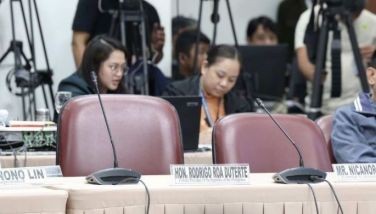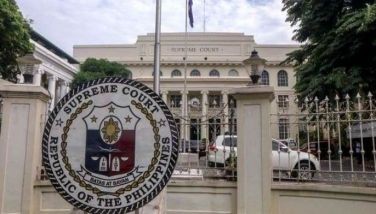SEAG security tightened
November 13, 2005 | 12:00am
Authorities have set up a tight security ring around the sites hosting the various sporting events of the 23rd Southeast Asian Games (SEAG) this year.
With only 14 days left until the games, police have intensified last-minute security checks on the country’s airports and hotel facilities for the 7,000 foreign athletes and delegates who will start arriving next week.
Security officials stressed these sites, along with the venues scattered across the country where the various sports competitions will be held, have been classified as "high-risk areas."
Philippine National Police (PNP) chief Director General Arturo Lomibao said they are now putting more emphasis on securing the areas.
Lomibao personally led an inspection team touring the country’s air and seaports, as well as the facilities where the participating athletes and officials will be billeted during the two-week sporting meet.
Before flying to Cebu to inspect the facilities there, Lomibao, along with Task Force SEAG commander Deputy Director General Avelino Razon, led police officials through a spot security inspection of Terminal 1 and Terminal 2 of the Ninoy Aquino International Airport (NAIA).
"They walked through the NAIA Terminal 1 and 2 at the Aviation Security Group (ASG) area of responsibility where the security and safety of more than 7,000 delegates start upon their arrival," PNP spokesman Chief Superintendent Leopoldo Bataoil said.
From NAIA, Lomibao and Razon flew to Cebu City to personally review security measures at the Mactan International Airport.
Bataoil added that Lomibao also inspected other places of SEAG engagement in Mandaue, Danao and Cebu cities, including the athletes’ billeting facilities.
In Cebu, Lomibao also witnessed the arrival of the SEA Games torch, virtually signaling the start of frenzied preparation for the international sporting event.
Lomibao reiterated his orders to all police field commanders during the command conference in Camp Crame to "proactively" address all threats that might affect the conduct of a successful SEAG.
Bataoil said the PNP is primarily focusing on the possibility of attacks from the communist New People’s Army (NPA) guerrillas.
"The most potent threat before, during and after the SEA Games, among others, is the continuing attack by the local communist terrorists on vulnerable targets," he said.
Bataoil shared the views aired the other day by National Security Adviser Norberto Gonzales who urged the command conference at the PNP headquarters last Friday to be more aggressive in addressing the decades-old communist insurgency.
"The PNP shall then change its mode of internal security operations from active defense to a more proactive enforcement through prophylactic patrols and engaging the enemy at their lairs, in coordination with the (military) units in the area," he said.
With only 14 days left until the games, police have intensified last-minute security checks on the country’s airports and hotel facilities for the 7,000 foreign athletes and delegates who will start arriving next week.
Security officials stressed these sites, along with the venues scattered across the country where the various sports competitions will be held, have been classified as "high-risk areas."
Philippine National Police (PNP) chief Director General Arturo Lomibao said they are now putting more emphasis on securing the areas.
Lomibao personally led an inspection team touring the country’s air and seaports, as well as the facilities where the participating athletes and officials will be billeted during the two-week sporting meet.
Before flying to Cebu to inspect the facilities there, Lomibao, along with Task Force SEAG commander Deputy Director General Avelino Razon, led police officials through a spot security inspection of Terminal 1 and Terminal 2 of the Ninoy Aquino International Airport (NAIA).
"They walked through the NAIA Terminal 1 and 2 at the Aviation Security Group (ASG) area of responsibility where the security and safety of more than 7,000 delegates start upon their arrival," PNP spokesman Chief Superintendent Leopoldo Bataoil said.
From NAIA, Lomibao and Razon flew to Cebu City to personally review security measures at the Mactan International Airport.
Bataoil added that Lomibao also inspected other places of SEAG engagement in Mandaue, Danao and Cebu cities, including the athletes’ billeting facilities.
In Cebu, Lomibao also witnessed the arrival of the SEA Games torch, virtually signaling the start of frenzied preparation for the international sporting event.
Lomibao reiterated his orders to all police field commanders during the command conference in Camp Crame to "proactively" address all threats that might affect the conduct of a successful SEAG.
Bataoil said the PNP is primarily focusing on the possibility of attacks from the communist New People’s Army (NPA) guerrillas.
"The most potent threat before, during and after the SEA Games, among others, is the continuing attack by the local communist terrorists on vulnerable targets," he said.
Bataoil shared the views aired the other day by National Security Adviser Norberto Gonzales who urged the command conference at the PNP headquarters last Friday to be more aggressive in addressing the decades-old communist insurgency.
"The PNP shall then change its mode of internal security operations from active defense to a more proactive enforcement through prophylactic patrols and engaging the enemy at their lairs, in coordination with the (military) units in the area," he said.
BrandSpace Articles
<
>
- Latest
- Trending
Trending
Latest





























